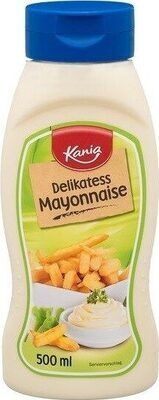
Barcode: 20051389
Mayonnaise
HALAL
📝 Reason: All ingredients in the product are either plant-derived or generally recognized as Halal, with no Haram or Doubtful ingredients identified. The product does not contain any meat or alcohol, and there are no indications of cross-contamination with Haram substances.
📄 Certificates: None
Ingredients:
Details
Understanding the Halal Status of Mayonnaise
When it comes to food products, many consumers are increasingly concerned about their Halal status, especially for condiments that are widely used, such as mayonnaise. Let’s take a detailed look at whether mayonnaise is Halal by breaking down its components and understanding their origins.
Halal Status Overview
The mayonnaise in question has been confirmed as Halal. This conclusion is based on the thorough analysis of the ingredients used in its composition. Notably, there are no Haram (forbidden) or doubtful ingredients present in the formulation, meaning it aligns with the dietary requirements of Muslim consumers.
Ingredient Breakdown
Let’s delve into each ingredient that makes up mayonnaise, exploring its status:
- Rapsöl (Rapeseed Oil) – Plant-derived oil, generally considered Halal. This oil is sourced from plants and, hence, forms a suitable base for mayonnaise.
- Eigelb (Egg Yolk) – Egg yolk, generally considered Halal. As long as it comes from Halal-certified sources, egg yolk is acceptable.
- Branntweinessig (Distilled Vinegar) – Vinegar can be Halal if derived properly, and fermentation of alcohol renders it Halal. It’s crucial to ensure that any vinegar used has undergone a complete transformation from its alcoholic base.
- Zucker (Sugar) – Sugar is universally accepted as Halal. This sweetener aligns with Halal principles.
- Speisesalz (Table Salt) – Salt is Halal. It contains no elements that are impermissible.
- Senf (Mustard) – Mustard is Halal, provided no Haram ingredients are mixed in. This condiment is commonly used in mayonnaise and should always be checked for any unwanted components.
- Citronensäure (Citric Acid, E330) – Citric acid is commonly derived from fermentation processes and is considered Halal.
- Calcium-Dinatrium-EDTA (E385) – This chelating agent is generally Halal if produced without any Haram materials. As a food additive, its acceptability depends on the manufacturing process.
Conclusion on Ingredients
All ingredients in mayonnaise are either plant-derived or are typically regarded as Halal. This product is free from meat, alcohol, and other animal derivatives, and there have been no noted instances of cross-contamination with Haram substances. Therefore, it is safe for Halal-conscious consumers.
Brand & Certification Context
While this mayonnaise does not have specific Halal certifications listed, the absence of Haram ingredients coupled with the nature of its components strongly confirms its Halal status. It is always advisable for consumers to seek products from reputable brands that guarantee such dietary compliance. Check labels and engage with producers about their sourcing to ensure complete peace of mind.
In summary, when the question arises about the Halal status of mayonnaise, the analysis shows a favorable result! It is Halal-friendly, making it a great addition to your meals without compromising your beliefs.

